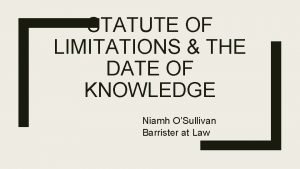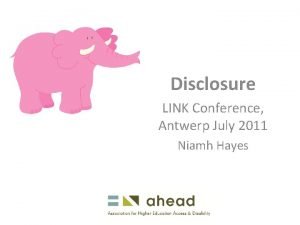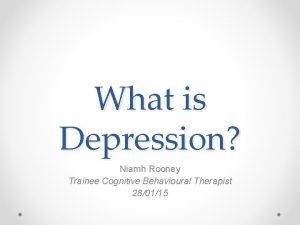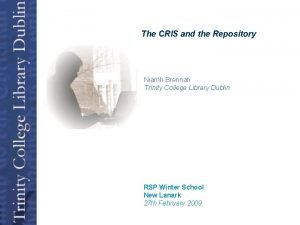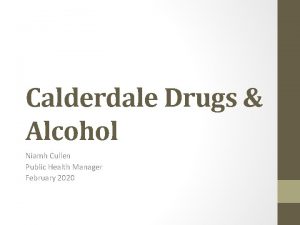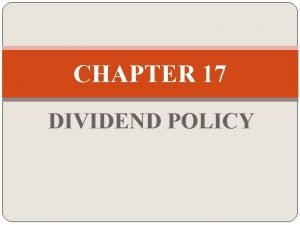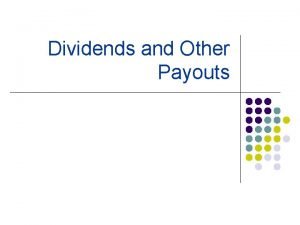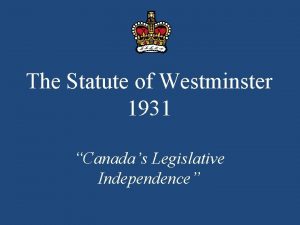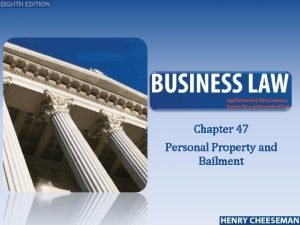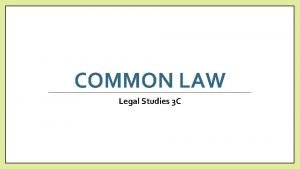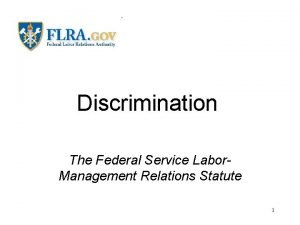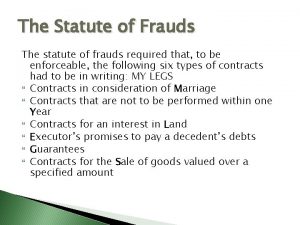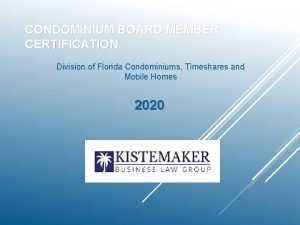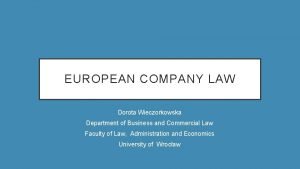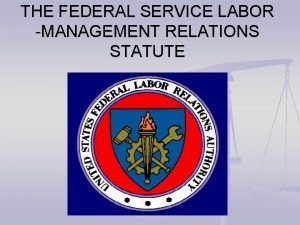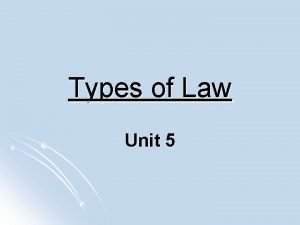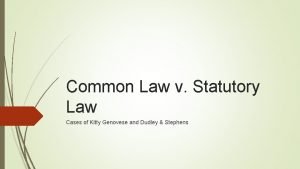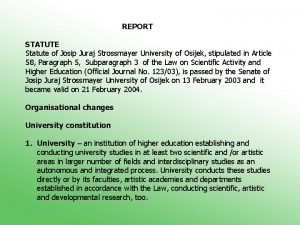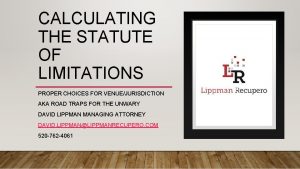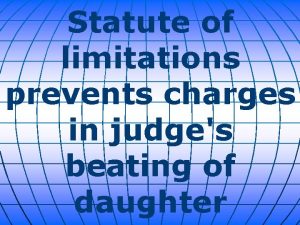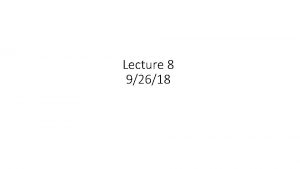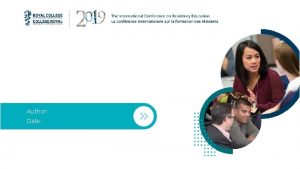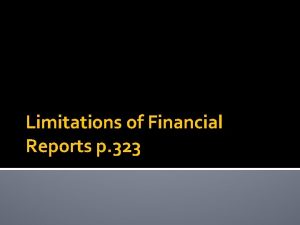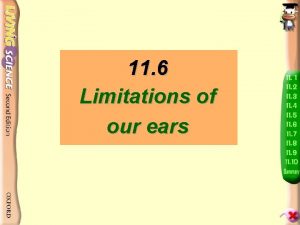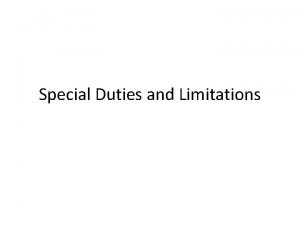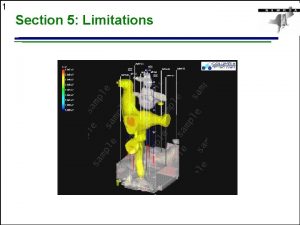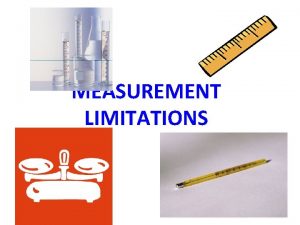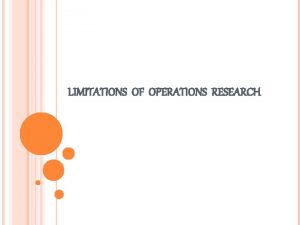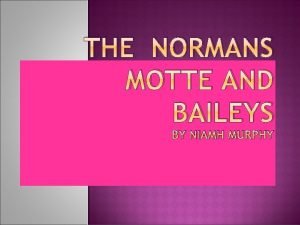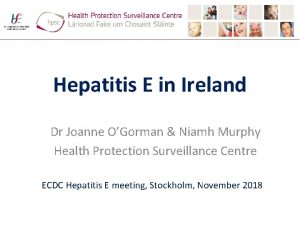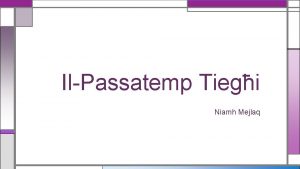STATUTE OF LIMITATIONS THE DATE OF KNOWLEDGE Niamh






![Earlier Cases on s. 2 of the 1991 Act: Gough v Neary [2003] 3 Earlier Cases on s. 2 of the 1991 Act: Gough v Neary [2003] 3](https://slidetodoc.com/presentation_image_h/0ff9df217e5dcf693ea7ce744bd71723/image-7.jpg)
![Cunningham v Neary [2004] IESC 43 ■ Unnecessary removal of ovary during emergency operation Cunningham v Neary [2004] IESC 43 ■ Unnecessary removal of ovary during emergency operation](https://slidetodoc.com/presentation_image_h/0ff9df217e5dcf693ea7ce744bd71723/image-8.jpg)
![Farrell v Ryan [2016] IECA 281 ■ Plaintiff had symphysiotomy procedure performed on Farrell v Ryan [2016] IECA 281 ■ Plaintiff had symphysiotomy procedure performed on](https://slidetodoc.com/presentation_image_h/0ff9df217e5dcf693ea7ce744bd71723/image-9.jpg)
![O’Sullivan v Ireland & Ors [2019] IESC 33 TIMELINE 20 September 2005 operation Plaintiff O’Sullivan v Ireland & Ors [2019] IESC 33 TIMELINE 20 September 2005 operation Plaintiff](https://slidetodoc.com/presentation_image_h/0ff9df217e5dcf693ea7ce744bd71723/image-10.jpg)







![Green v Hardiman [2019] IESC 51 ■ Plaintiff claimed that the defendant negligently carried Green v Hardiman [2019] IESC 51 ■ Plaintiff claimed that the defendant negligently carried](https://slidetodoc.com/presentation_image_h/0ff9df217e5dcf693ea7ce744bd71723/image-18.jpg)





- Slides: 23

STATUTE OF LIMITATIONS & THE DATE OF KNOWLEDGE Niamh O’Sullivan Barrister at Law

Overview § Applicable limitation period in personal injury cases § S. 2, Statute of Limitations (Amendment) Act 1991 - Date of knowledge test § Recent Supreme Court decisions on s. 2: § O’Sullivan v Ireland & Ors [2019] IESC 33 § Green v Hardiman [2019] IESC 51 § Proposed changes to limitation periods for clinical negligence actions

Pre 1991 Position ■ No provision for discoverability under Statute of Limitations Act 1957 ■ Hegarty v O’Loughran [1990] 1 IR 148: “I would, therefore, conclude that the proper construction of [s. 11(2)(b) of the Statute of Limitations Act 1957] is that contended for on behalf of the defendant and that it is that the time limit commenced to run at the time when a provable personal injury, capable of attracting compensation, occurred to the plaintiff which was the completion of the tort alleged to be committed against her. ” ■ Cause of action accrued on date of damage, regardless of Plaintiff’s knowledge

Statute of Limitations (Amendment) Act 1991 § Introduced significant changes to limitation periods for personal injuries actions § S. 3 (1) sets down the limitation period for personal injuries actions: “An action … claiming damages in respect of personal injuries to a person caused by negligence, nuisance or breach of duty … shall not be brought after the expiration of 2 years from the date on which the cause of action accrued or the date of knowledge (if later) of the person injured. ” § ‘Knowledge’ is given a specific statutory meaning in s. 2 of the Act.

s. 2(1) Statute of Limitations (Amendment) Act, 1991 A person’s date of knowledge is referenced by the date they had knowledge of: (a) that the person alleged to have been injured had been injured (b) that the injury in question was significant. (c) that the injury was attributable in whole or in part to the act or omissions which is alleged to constitute negligence, nuisance or breach of duty. (d) the identity of the Defendant, and (e) if it is alleged that the act or omissions was that of a person other than the Defendant the identity of that person and the additional facts supporting the bringing of an action against the Defendant. ■ Knowledge that any acts or omissions did or did not, as a matter of law, involve negligence, nuisance or breach of duty is irrelevant

1991 Act: ■ S. 2(2) : A person’s knowledge includes knowledge which he might reasonably have been expected to acquire: (a) from facts observable or ascertainable by him, or (b) from facts ascertainable by him with the help of medical or other appropriate expert advice which it is reasonable for him to seek. ■ S. 2(3): Notwithstanding subsection (2)– (a) a person shall not be fixed under this section with knowledge of a fact ascertainable only with the help of expert advice so long as he has taken all reasonable steps to obtain (and, where appropriate, to act on) that advice, and (b) a person injured shall not be fixed under this section with knowledge of a fact relevant to the injury which he has failed to acquire as a result of that injury.
![Earlier Cases on s 2 of the 1991 Act Gough v Neary 2003 3 Earlier Cases on s. 2 of the 1991 Act: Gough v Neary [2003] 3](https://slidetodoc.com/presentation_image_h/0ff9df217e5dcf693ea7ce744bd71723/image-7.jpg)
Earlier Cases on s. 2 of the 1991 Act: Gough v Neary [2003] 3 IR 92 • Per Geoghegan J: “While it may not be necessary for the purposes of starting the statute to run to know enough detail to draft a statement of claim, a plaintiff in my opinion must know enough facts as would be capable of at least upon further elaboration of establishing a cause of action even if the plaintiff has no idea that those facts of which he has knowledge do in fact constitute a cause of action as that particular knowledge is irrelevant under the Act. ” • Geoghegan J cited the principle outlined in Spargo v North East Essex Health Authority that the plaintiff must have broad knowledge of the causally relevant acts or omissions which are alleged to constitute negligence and to which the injury is attributable. Attributable means “capable of being attributed to” as a “real possibility” • The plaintiff would have to know or be expected to know that the hysterectomy was unnecessary before she could be said to have "a broad knowledge of the essence of the causally relevant act or omission to which the injury is attributable". • Mere knowledge of the hysterectomy is irrelevant – it was only when the plaintiff discovered that the operation was unnecessary that time began to run
![Cunningham v Neary 2004 IESC 43 Unnecessary removal of ovary during emergency operation Cunningham v Neary [2004] IESC 43 ■ Unnecessary removal of ovary during emergency operation](https://slidetodoc.com/presentation_image_h/0ff9df217e5dcf693ea7ce744bd71723/image-8.jpg)
Cunningham v Neary [2004] IESC 43 ■ Unnecessary removal of ovary during emergency operation in 1991 ■ Proceedings issued in March 2002 – Defendant claimed it was statute barred ■ Fennelly J: “…at the stage when the plaintiff wrote to the Medical Council, she had knowledge of the fact that the defendant had removed her ovary in 1991, that she had twice asked him why he had done so, that she had received no explanation at all and that other women had made serious complaints about the defendant. This knowledge was such that it was then “reasonable” for her to seek medical or other expert advice. … if the plaintiff had gone to a solicitor in December 1998, she would have obtained the sort of advice which would have made out a case in negligence against the defendant. Therefore, the key fact that the removal of the ovary had been unnecessary was “ascertainable” and, for the purposes of the section, the plaintiff is deemed to have had knowledge of it as of that date. ■ Claim held to be statute barred
![Farrell v Ryan 2016 IECA 281 Plaintiff had symphysiotomy procedure performed on Farrell v Ryan [2016] IECA 281 ■ Plaintiff had symphysiotomy procedure performed on](https://slidetodoc.com/presentation_image_h/0ff9df217e5dcf693ea7ce744bd71723/image-9.jpg)
Farrell v Ryan [2016] IECA 281 ■ Plaintiff had symphysiotomy procedure performed on her in 1963. ■ 18 February 2010 - a friend informed her of Primetime investigation about symphysiotomy, following which plaintiff sought her medical records ■ August 2011 – medical records received from the Coombe ■ High Court (Cross J): Date of knowledge did not start to run until plaintiff received her medical records in 2011 – only then did she had knowledge “to justify embarking on the preliminary to issue a writ” ■ Court of Appeal (Peart J): “It is incorrect as a general proposition that a Plaintiff may wait until she has received her medical records before time starts to run against her under the Statute, that would give a Plaintiff control over when time starts to run as it would be dependent on how long the Plaintiff chooses to wait before seeking her records. If a Plaintiff has had an operation or some procedure carried out and thereafter has suffered adverse sequelae in the nature of a personal injury reasonably attributable to what was done, she does not need to wait for her hospital records or other records to arrive before she can be taken to know that she has a cause of action. ” ■ Plaintiff had sufficient knowledge as of 18 February 2010 - claim statute barred
![OSullivan v Ireland Ors 2019 IESC 33 TIMELINE 20 September 2005 operation Plaintiff O’Sullivan v Ireland & Ors [2019] IESC 33 TIMELINE 20 September 2005 operation Plaintiff](https://slidetodoc.com/presentation_image_h/0ff9df217e5dcf693ea7ce744bd71723/image-10.jpg)
O’Sullivan v Ireland & Ors [2019] IESC 33 TIMELINE 20 September 2005 operation Plaintiff became infected with MRSA during course of 30 September 2005 Readmitted to hospital for emergency operation 4 October 2005 Informed that he had contracted MRSA March 2006 Plaintiff’s mother informs him about MRSA TV programme. Plaintiff contacts participant, Mr Kavanagh 20 March 2006 solicitor On Mr Kavanagh’s recommendation, Plaintiff contacts who specialises in MRSA cases 2 May 2006 Plaintiff makes FOI request for his hospital records 21 June 2006 Mr Simon writes to hospital requesting that the FOI fee be waived as client is seeking medical records contracted a hospital-acquired infection in “because he your hospital”

17 July 2006 operation noting a Solicitor receives hospital records (800 pages) - includes report on a swab taken on date of second heavy growth of MRSA (19 September 2007 2 years from date of MRSA infection ) 22 February 2007 Preliminary report from Dr Cummins, GP *HC date of knowledge* 16 May 2008 Date of final specialist report of Mr John Scurr *CA date of knowledge (Ryan P, Edwards P)* 19 August 2008 Plenary Summons issues

Judgments in HC/Co. A ■ High Court, Kearns P: – This is a case where the facts were not observable or ascertainable by the plaintiff himself and could only be ascertained with the help of a medical or other expert – Date of knowledge held to be 22 February 2007, when Dr Cummins furnished his report and on which date there was “a congruence of all the requisite elements under the statute to start the clock ticking. ” ■ Court of Appeal – Majority upheld finding of trial judge but disagreed on date of knowledge – Ryan P: Plaintiff did not have requisite knowledge until 16 May 2008, when Prof Scurr’s expert report was received, which “provided the last piece or pieces of the jigsaw of required information” – Irvine J, dissenting, held that by 17 July 2006, at latest, P had actual or constructive notice of all the facts sufficient to meet requirements of S. 2(1) of the 1991 Act

Supreme Court ■ Four to one majority in SC dismissed hospital’s appeal and held that the claim was not statute barred having regard to the Plaintiff’s date of knowledge ■ Charleton J summarised the law at paras 33 -35 of his decision: “ 33. Where a plaintiff claims that he or she did not commence a case due to knowledge of their injury, and of the broad facts alleged to constitute an actionable negligence, coming to them at a date later than the occurrence of the wrong in question, a number of factors must be considered. 34. The first step in determining whether time begins to run at that later date, or on the earlier date of the occurrence of the alleged wrong, requires judges to examine the way the plaintiff puts his or her case and to distil what he or she is complaining about. That inquiry is into the truth of any such assertion, to determine the point at which such a plaintiff had, in broad terms, knowledge of the facts on which that complaint is based. Such knowledge is sufficient to start the time running if it justifies the plaintiff in both consulting a solicitor and also in being able to give an outline of the broad factual parameters of his or her case; that is what happened to the plaintiff as a result of a wrong by someone else…

Charleton J contd. : . . . In this context, the limitation period may be delayed because a potential plaintiff did not have such broad knowledge of one or more of the following: knowledge that they had been injured by what they complain of; or knowledge that the proposed defendant had done something wrong; or knowledge that the injury was significant; or knowledge as to the identity of the proposed defendant or defendants. It is knowledge that the proposed defendant had done something wrong which is the key factor in most cases; that is, broad knowledge of the act or omission in consequence of which that plaintiff says that he or she was subject to an act or omission that should not have occurred. Any later legal analysis as to whether, as a matter of law, such act or omission is negligence is not relevant. What caused the accident is relevant, whether or not that act or omission amounted in law to negligence. 35. The core issue is always at what stage such a plaintiff had such broad knowledge from facts which he or she either had, or might reasonably have been expected to acquire, from observable or ascertainable facts, or only on the basis of consulting an expert to ascertain such fact or facts. Having been consulted in such a timely fashion as a reasonable person would pursue that step, it is then the task of the expert to identify any act or omission that is alleged to constitute a wrong. Failure to take timely steps to pursue broad knowledge of facts by consulting an expert, or inertia in acting on such knowledge when received, does not stop time running.

Charleton J at para 36: “When his solicitor inspected the records, MRSA was mentioned as a positive swab result. That fact, however, was not enough to start time running. As Finlay Geoghegan states at paragraph 78 of her separate judgment, a plaintiff must identify acts or omissions that are alleged to constitute negligence. An MRSA infection can be caught in a hospital, in any event, and without negligence on the part of any treating medical person and despite care in the hygiene management of the hospital. On his solicitor having the hospital records analysed, an outbreak of the disease in the hospital from which he should have been protected became the broad knowledge which he had and on which he was to base his case. That was the point at which time began to run. Then there was a later expert report which clarified the particular alleged wrongs, but it was from the receipt of the family practitioner’s report on 22 February 2007 that time began to run. That constituted the relevant broad knowledge. Nothing prior did. ”

Finlay Geoghegan J ■ The transmission of MRSA to the plaintiff was not the causally relevant act or omission alleged to constitute negligence ■ MRSA can be acquired during a hospital stay without any act or omission by a hospital which would constitute negligence ■ Therefore, the plaintiff had to identify acts / omissions of the hospital alleged to have caused the transmission of the MRSA to him and to constitute negligence ■ Para 81: “I am satisfied that the plaintiff only acquired broad knowledge of the causally relevant acts or omissions of the hospital alleged to constitute negligence, to which his MRSA was capable of being attributed, on a date after 20 August 2006. By reason of this conclusion it is unnecessary to consider on what later date the plaintiff acquired the requisite factual knowledge. ”

O’Donnell J, dissenting ■ O’Donnell J agreed with the majority that the required knowledge for the purpose of s. 2(1)(c) is “broad knowledge of the causally relevant acts and omissions” ■ However, he rejected the date of receipt of either the GP report or expert report as being the date upon which knowledge was acquired for purpose of s. 2(1)(c): “Indeed, it was because the MRSA contracted by the plaintiff was capable of being attributed to want of care on the part of the hospital that each report was sought. That was also why the freedom of information request was made for the plaintiff’s hospital records, and arguably why the plaintiff consulted a solicitor specialising in MRSA cases. If, however, it is considered that this was not the case, the approach of Fennelly J in Cunningham v Neary must be applied to this case. The information given to the plaintiff on 4 October 2005, either on its own or in conjunction with the television programme, if not providing the plaintiff with the relevant knowledge under s. 2(1)(c), at least put him on inquiry. ”
![Green v Hardiman 2019 IESC 51 Plaintiff claimed that the defendant negligently carried Green v Hardiman [2019] IESC 51 ■ Plaintiff claimed that the defendant negligently carried](https://slidetodoc.com/presentation_image_h/0ff9df217e5dcf693ea7ce744bd71723/image-18.jpg)
Green v Hardiman [2019] IESC 51 ■ Plaintiff claimed that the defendant negligently carried out a laparotomy procedure in December 2007, resulting in the plaintiff developing a hernia ■ Proceedings issued in August 2012 ■ Plaintiff claimed he only had sufficient knowledge of the acts/omissions alleged to constitute negligence on receipt of the expert report in May 2012 or on receipt of his medical records in March 2011, at the earliest ■ Significant that in January 2009, plaintiff was advised by another surgeon, who did not have sight of his 2007 hospital records, that there was minimal connection between his surgeries and his hernia ■ Both HC and CA found claim was not statute barred on basis that it was only when the plaintiff received his medical records, that the basis of the case and the attribution of his injuries to the failures on 14 th and 15 th December could be known ■ Decision in Farrell v Ryan distinguished on facts

Timeline 11 Dec 2007 Plaintiff’s bowel accidentally perforated during laparotomy procedure 14 Dec 2007 scan. P became very ill. Bloods showed raised white cell and elevated CRP. No CT 19 Dec 2007 Second laparotomy resulted in stoma. 6 Feb 2008 Stoma reversed 27 Mar 2008 Surgeon (Prof N) indicates in letter that P had ventral hernia consequent on sepsis of the abdomen and the second operation – advised treatment in six months when he had got better. No follow up appointment given Dec 2008 P referred to new surgeon due re troublesome hernia 14 Jan 2009 New surgeon (Prof M) advises that without benefit of hospital notes, that any connection between the operations and his hernia was minimal 31 Jan 2011 Condition worsened over intervening years and P contacted a solicitor 31 Mar 2011 initial Medical records received from Tallaght Hospital - References to perforation – considered as possible negligence *found at trial this can happen without want of care 3 May 2012 Expert report received which found that the failure of intervention and testing on 14 Dec 2007 was cause of plaintiff’s problems 7 Aug 2012 Proceedings issued

Decision of the Supreme Court ■ Charleton J stated that the law is as stated in O’Sullivan v Ireland ■ Having considered the facts, the decision of the Court of Appeal was upheld: “The limitation period was delayed in the exceptional circumstances of this plaintiff being given, in good faith and on the basis of a professional assessment, an incorrect set of facts in consequence of taking the reasonable step of consulting expert medical advice. In consequence, it would not be within the section of the 1991 Act for the plaintiff to be required to reverse the conclusion, based on expert advice, that was involved was a natural progression of his existing condition. What he had not been aware of until much later was the facts which were within the section of the 1991 Act. These identified an act or omission on the part of the treating surgeons as having caused his significant injury. Thus, it was only later that it became reasonable for him to act: that is when he became aware that the delay in treating him on second presentation was the operative cause of the hernia problem. Had he not been assured by the surgeon he consulted after the treatment in question that his hernia problem was due to an existing condition, it would have been reasonable for him to have earlier pursued the case.

Amendment to limitation period for “clinical negligence” actions v S. 221 of the Legal Services Regulation Act 2015 has amended the 1991 Act to provide for a 3 year limitation period for “clinical negligence” actions. v The amended section, which had not yet been commenced, provides as follows: 3. — (1) An action, other than one to which section 6 of this Act applies, claiming damages in respect of personal injuries to a person caused by negligence, nuisance or breach of duty (whether the duty exists by virtue of a contract or of a provision made by or under a statute or independently of any contract or any such provision) shall not be brought after the expiration of — (a) in the case of a clinical negligence action within the meaning of Part 2 A of the Civil Liability and Courts Act 2004 3 years, or (b) otherwise, 2 years, from the date on which the cause of action accrued or the date of knowledge (if later) of the person injured.

Questions? Thank you!

Contact ■ Niamh O’Sullivan BL ■ Law Library, Four Courts, Inns Quay, Dublin 7 ■ DX: 810235 ■ Email: nosullivan@lawlibrary. ie ■ Phone: 086 1073291
 Niamh o sullivan bl
Niamh o sullivan bl Dr niamh hayes
Dr niamh hayes Niamh rooney
Niamh rooney Niamh brennan tcd
Niamh brennan tcd Dr niamh hayes
Dr niamh hayes Whats wrong with niamh cullen
Whats wrong with niamh cullen Niamh heaney
Niamh heaney Dividend payment
Dividend payment Eligibility for dividend
Eligibility for dividend Statute of westminster 1931
Statute of westminster 1931 Estray statute
Estray statute Precedent example
Precedent example Federal service labor management relations statute
Federal service labor management relations statute My legs statute of frauds
My legs statute of frauds Florida condominium board member certification
Florida condominium board member certification Company statute
Company statute Statute of frauds my legs
Statute of frauds my legs Federal service labor-management relations statute
Federal service labor-management relations statute Statute law examples
Statute law examples Chapter 252 florida statutes
Chapter 252 florida statutes Difference between common law and statute law
Difference between common law and statute law Alabama dui statute
Alabama dui statute Book smarts definition
Book smarts definition Knowledge creation and knowledge architecture
Knowledge creation and knowledge architecture
